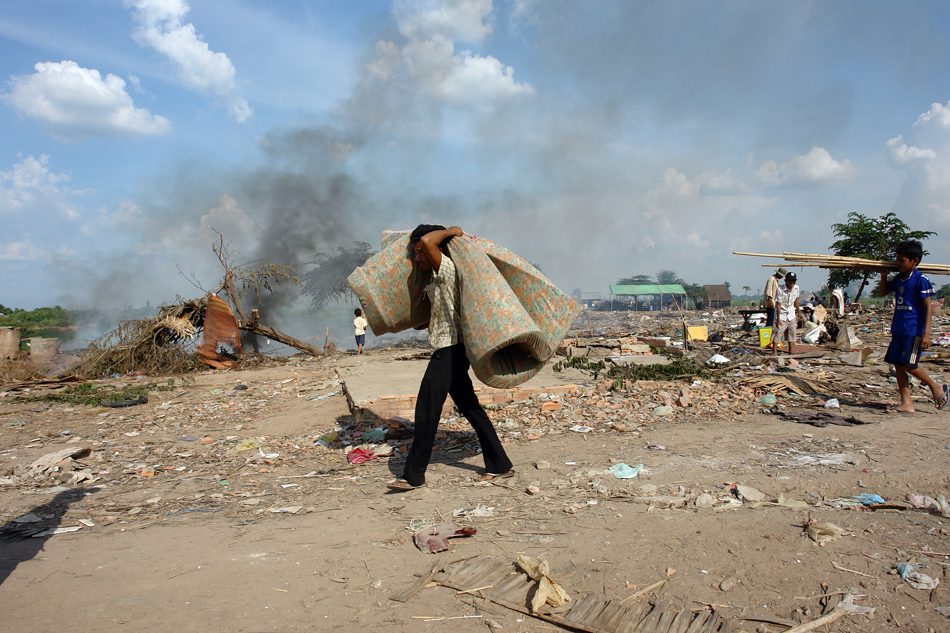Ambiguous laws and a weak court system add up to big trouble for uprooted villagers trying to get a fair deal
By Bridget Di Certo
As large infrastructure projects in Cambodia accelerate – from hydropower dams to cross-country highways, from enormous agricultural endeavours to new satellite cities – the social cost associated with its progress is also stepping on the gas, bringing disruption to the everyday lives of villagers whose homes lie in the path of development.

Cambodians across the country are asking the same question as bulldozers and worksites clunk noisily beside them: “What will happen to us?”
In November last year, the finishing touches and necessary signatures were put on legal documents making way for the enormous Lower Sesan 2 hydropower dam project in Stung Treng province. But even as champagne glasses were being clinked over the finalisation of the project, thousands of families living on land that would soon be inundated by the dam’s waters still had no details on how or where they would be resettled.
Cambodia has no national resettlement legislation or policy. Resettlement obligations are spread out over various pieces of legislation, including the constitution, ad hoc sub-decrees and private contractual arrangements.
The Cambodian government has taken a ‘hands off’ approach to resettlement negotiations between developers and villagers, Council of Ministers spokesman Phay Siphan said.
“We wish these things to be sorted out between the people and the company,” he added. “We [the government] don’t want to interfere, we want to give the right to the company developer and the people to agree [on compensation arrangements].”
Cambodia’s constitution stipulates that a citizen may only be deprived of his or her ownership of land where it is in the public interest, in accordance with the law, and where fair and just compensation has been provided in advance – a position replicated in the country’s 2001 Land Law.
Various smaller, temporary edicts in the form of ‘prakas’ have been passed by the government on resettlement obligations and issues, but many of these are time- and place-specific and can be inconsistently drafted and implemented.
Cambodian rights groups believe that a lack of policy unity or clear guidelines at both national and sub-national levels make it practically impossible for resettlement to be in accordance with the law, or with the provision of fair and just compensation.
“Fair and just compensation depends on the market value and [the government] does not clarify this specifically in any laws – how can a company know what is the proper compensation?” said Vann Sophat, land reform project coordinator for the Cambodian Centre for Human Rights (CCHR), who works closely with villagers who will be or have been displaced by major infrastructure projects.
“The government should have some guidelines, or a survey based on area-by-area studies so they can set a base cost for compensation,” Sophat said, adding that such guidelines should price improvements and permanent fixtures to the property such as housing or farming structures, electricity and wells installed by villagers.
But the government’s position is that these matters are better ascertained via case-by-case analysis by companies and national or sub-national ministerial committees, according to Siphan.
“Of course we can come across a number of complicated mechanisms with this: old policies, new activities,” said the Council of Ministers spokesman. “But this is why we suggest these cases are taken to the court.”
The government’s current policy for relocation is the so-called ‘leopard-skin’ planning policy: When an area of land is granted to a private developer, any villages or homes that are within the granted land remain the property of those homeowners. Only the land around these private homes is granted to developers, creating a spotted ‘leopard-skin’ effect.
As Siphan conceded, often in complicated and large-scale developments, these endeavours can become embroiled in various layers of red tape between private negotiations, sub-national governmental involvement and central governmental policy. That is why, Siphan emphasised, the impetus is on citizens to take their disputes to the courts.
The most common process employed to grant long-term 99-year lease land concessions to a private developer sees the government reclassify land as state land and then grant title to a developer.
The right to just terms of compensation for public acquisition of property is a common constitutional guarantee worldwide and also one of the most heavily litigated, given the malleable nature of the criteria “just terms”.
While courts may be the first place for providing guidance on the contentious constitutional guarantee in other countries, such legal debate is unlikely in Cambodia, CCHR’s Sophat countered.
“The court only recognises the people’s land disputes depending on their land title. They forget that in the land law there are other ways to prove [title] and that villagers might not have enough money to make a land certificate or to make a court case,” he said.
As the Cambodian government has acknowledged publicly, the country’s court system is severely under-resourced and might not be able to handle a flood of just terms and resettlement litigation.
“Even the few laws that are in place – like you have to give people proper notice and information – the company and the authorities ignore this obligation,” Sophat said.

